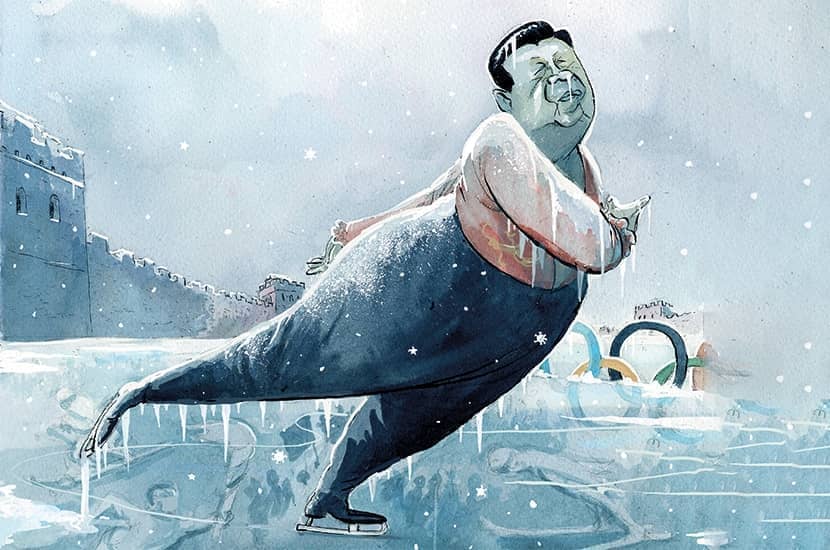To understand what Xi Jinping wants from the Winter Olympics, look at the man chosen to direct the opening ceremony. Zhang Yimou is one of China’s most famous film directors, but his hits (such as Hero and Raise the Red Lantern) are better loved by foreigners than by the Chinese. His job is to wow the outside world with images of China’s power and culture. In a deeply controversial Olympics — already being boycotted by ministers and officials from the US, Britain and many others — he is Beijing’s secret artistic weapon.
But unlike the extravagance of Beijing’s 2008 opening ceremony (also directed by Zhang), this Winter Olympics will be a decidedly pared-down affair. There will be no real-life audience, with the exception of a select few, after organizers decided last month not to sell tickets to the general public. Under China’s zero-Covid strategy, every outsider is seen as a potential virus-carrier. Where 2008 was dubbed “China’s coming-out party,” this Winter Olympics will reveal a country firmly shutting itself in.
At first, Covid was seen as China’s Chernobyl moment: proof that, with its instinct to cover things up, the one-party state was unable to handle a new pathogen. But as 2020 progressed, another feature of the one-party state came into its own — Xi’s short but brutal lockdowns. They were imitated worldwide and seemed to stifle the virus, minimizing economic damage and deaths. The subsequent plan was to vaccinate and reopen.
Then the Omicron variant changed everything. Having seen so few infections (just over 100,000 to date), China has little natural immunity. More than a billion people — 85 percent of the population — have been double-jabbed. But the rollout has been built entirely on Chinese vaccines, which have performed poorly in the real world and in clinical trials. One study estimates that 95 percent of those infected in the city of Tianjin had been fully vaccinated. Another found that, with the homemade Sinovac, “none of the recipients had detectable neutralizing antibody to the Omicron variants.” With so little immunity from either infection or vaccines to fall back on, China may now be more vulnerable to Covid waves than any other country in the world. The only thing keeping the virus at bay is the zero-Covid policy.
For their part, the Chinese remain terrified of the virus. It’s partly a cultural thing: as a society, it has always been rather health-obsessed. A tendency towards hypochondria has not been helped by state media, which has enthusiastically reported on Covid flare-ups across the world. When Britain unlocked last summer and declared itself ready for a third wave, Chinese media described this as a “surrender” to the virus. There is an ideological element to the reporting, with zero-Covid portrayed as proof of how much communist China cares — going to greater lengths to protect human life than the capitalist West. (Some of my family, echoing arguments seen online, see it as a clash between Confucian and Darwinian values.)
This was an easier trade-off to make when China remained Covid-free and largely at liberty. Now, Delta is flaring again and Omicron has entered the country. When a single visitor to Shanghai Disneyland tested positive in October, 34,000 people were locked inside. Every so often, entire cities are locked down. Those deemed to have been in contact with an infected person are escorted to state-run quarantine centers. Unpleasant stories about the conditions in these facilities abound, with families separated. In Nanjing, my home city, there was nationalistic outrage when foreign visitors were said to have been given better food and more water in quarantine.
Within two months of the Wuhan lockdown, some 4.5 million people were deployed as “grid workers.” Each one is assigned a chunk of a neighborhood to monitor, and this kind of community monitoring is still important today (on the family WeChat group, my cousin shares screenshots of neighbors volunteering for the role in order to have something to do during lockdowns). Grid workers check records, encourage vaccination and keep tabs in general, creating a new surveillance network. It’s easy to do when most of China’s urban population live in concentrated apartment blocks. The system has already been put to non-clinical use with some judges asking grid workers to locate people wanted for court cases.
When not in lockdown, China lives by a smartphone app whose color — green, amber or red — is a passport to enter public places such as restaurants and shops. Those without such an app can find it hard to get around. One Hong Kong fugitive allegedly turned himself in because he found it impossible to get by without his pass — the message being that this system can fight crime as well as Covid. And sometimes, app glitches just seem too convenient: there are reports of government critics and foreign journalists finding their “green” health code suddenly turning amber or red without explanation. During more relaxed times, the app is a formality, my aunt in Nanjing tells me, with barely a cursory glance given by shopkeepers. But these days China is not relaxed.
It’s a common misconception that the central government directs all lockdowns —in fact, restrictions take hundreds of forms in millions of cases. When daily cases rose above 150 in the ancient city of Xi’An, its lockdown went further than any before: residents weren’t allowed to leave home even to shop. Free food rations were arranged, but delivering them to a city of 13 million was always going to be difficult. Residents vented or poked fun on social media, filming themselves making broth with a single noodle, or subversively bartering vegetables for cigarettes with neighbors. My cousin in Xi’An used WeChat to reassure us he had enough food. But others ran out: at one point, a young man who dared leave home to buy steamed buns was beaten up by grid workers. The footage went viral and the neighborhood watch was forced to apologize.
Omicron is about three times as contagious as Delta, itself twice as contagious as the original Wuhan strain, so China’s zero-Covid game has become a lot harder. Locally transmitted cases are now popping up in Beijing (sixty-four in the last week of January), raising the prospect of a citywide lockdown during the Olympics. It would be embarrassing enough for the Games to become a super-spreader event, but any health risk to the Chinese leadership (ensconced in Beijing’s Zhongnanhai government complex and likely showing face at the Games) is even worse. The average age on the Politburo Standing Committee is sixty-three.
So, other than a few world leaders and a few well-connected Chinese, there’ll be no live audience this time around. The 3,000 athletes will be ferried around by a transportation system of special buses, taxis and high-speed trains, closed to the public. In Beijing, locals have been warned not to approach Olympic vehicles, even if they’re involved in a crash. Cooks, drivers and volunteers will be bubbled along with the athletes — any Chinese leaving the Olympic bubble will have to quarantine for twenty-one days afterwards. This is not the sign of a country preparing to open up any time soon.
The government was always going to wait until after the Chinese Communist Party’s big conference in October — the moment when Xi was originally meant to step down but will instead be cemented in his status as “ruler for life” — before opening up. Xi might think about 2023 as a year to start reopening, but even that’s not certain. It’s possible that by then, Beijing may have a made-in-China mRNA vaccine (it has pointedly never licensed the western-made Pfizer) and there’s also talk of a made-in-China antiviral. But if China’s track record on vaccine efficacy is anything to go by, medical breakthroughs could take some time.
Xi looks prepared to wait, but keeping up the zero-Covid approach will come at an economic cost. Some four million small businesses closed last year and migrant workers have been seen sleeping in the streets as their zero-hours contracts are cancelled overnight. Factories supplying Apple, Samsung, Volkswagen and Toyota have been shut in recent months — causing concern that spluttering Chinese supply will hold back recovery in the rest of the world. Yet while other economies shrank, China’s grew in 2020 and surged by 8 percent last year. Growth is estimated at 4.8 percent this year as the lockdowns take their toll.
There are signs that even the ever-pliant Chinese are fatigued with all the locking down. Ruili, a small southern city close to Myanmar, is on its fifth lockdown and the tourism and border trade that sustained the local economy is on ice. Its population is thought to have fallen by a fifth after an exodus of the richest. Residents complain that they haven’t had an income in more than a year and that the government support (about $130 for six months) is simply not enough. Even those who are not locked down wish for better days — on a call, my aunt laments to me that “this Chinese New Year simply doesn’t have the atmosphere.”
Yet none of this adds up to a co-ordinated anti-lockdown movement, and when it comes to defusing anger, central governments are unafraid to use local scapegoats. Wherever a local outbreak is found, dozens of city officials are demoted and blamed for the lockdown. In Henan, one local mayor criticized people traveling for Chinese New Year this week as practicing “malicious homecoming” — a phrase that rankles in China as much as if someone said something similar about Christmas in the West. In these instances, state media bashed the local officials involved, directing public ire against the symptoms of the zero-Covid policy rather than its underlying logic. At all stages, Beijing is protected from criticism.
There’s no easy way out of China’s self-imposed isolation, not least because zero-Covid has become a part of Xi’s political legacy. “When it comes to protecting the safety and lives of the people, we will not baulk at any price,” Xi said in September 2020. “The Chinese Communist Party’s fundamental mission is to serve the people with its heart and soul. Ours is a socialist country run by the people.” The public has bought this narrative, and with the country’s lack of immunity, Xi couldn’t U-turn on zero-Covid even if he wanted to. Instead, he’s crossing his fingers for a pharmaceutical breakthrough. With the bar set so high, it’d have to be something of a miracle. Until then, the country has no choice but to live with zero-Covid, and all that comes with it.
This article was originally published in The Spectator’s UK magazine. Subscribe to the World edition here.


















